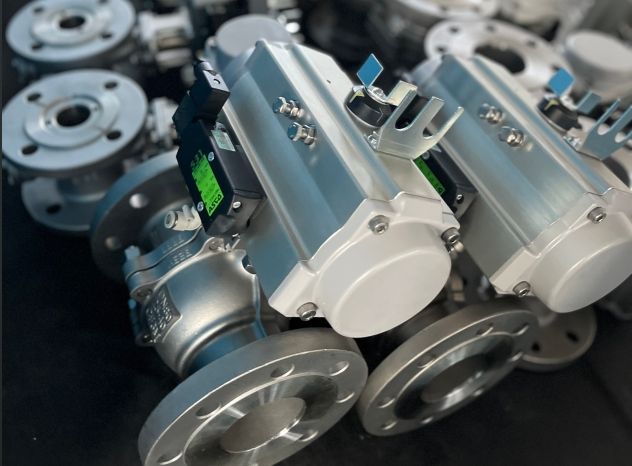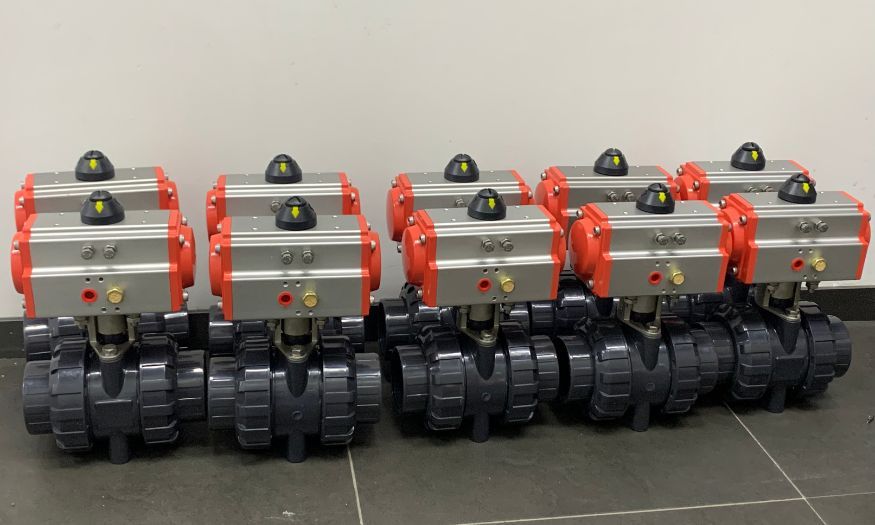Tech Theory: Technical…Practical… Interesting Automation Industrial Solutions

At DELCO, we understand the importance of customer satisfaction and strive to meet the unique needs of every client. As a reliable valve supplier, we are committed to providing excellent customer service and high-quality products to ensure optimal performance and longevity. By choosing DELCO as your trusted control air supplier, you can benefit from customized valve assemblies designed specifically to meet your requirements, enhancing efficiency and reducing downtime.
What Are Pneumatic Valves?
Pneumatic valves are crucial in various industrial processes, controlling the flow of gases and liquids with precision using compressed air. This comprehensive guide delves into the functionalities, applications, and benefits of pneumatic valves, offering insights to enhance your understanding and optimize their use.
Table of contents
- What Are Pneumatic Valves?
- How Do Pneumatic Valves Work?
- Common Applications of Pneumatic Valves
- Available Materials and Sizes
- Advantages of Pneumatic Valves
- Maintenance and Care
- Frequently Asked Questions
- Conclusion
- Why more and more international valve brands choose DELCO for OEM service?
- How to get a quick quote for industrial valves?
What Are Pneumatic Valves?
Pneumatic valves are mechanical devices designed to regulate fluid flow in a system using compressed air. They are pivotal in industrial automation, providing accurate control over the direction and pressure of fluids. Key components of pneumatic valves include:
- Valve Body: The central housing that contains the valve’s internal mechanisms.
- Actuator: Moves the valve stem in response to compressed air pressure.
- Control Mechanism: Directs the air to the actuator to manage valve operation.


How Do Pneumatic Valves Work?
Pneumatic valves operate based on air pressure differences. Here’s a detailed explanation:
- Compressed Air Reservoir: Compressed air is stored and managed within the valve system, supplied by a compressor.
- Activation: When air pressure compresses internal springs, the diaphragm moves downward, closing the valve.
- Deactivation: Releasing the air allows springs to expand, opening the valve.
This mechanism ensures precise control of fluid flow and pressure, making pneumatic valves essential for smooth and efficient operations.
Common Applications of Pneumatic Valves
Pneumatic valves are versatile and used across various industries:
- Industrial Automation: Control pressure and actuate components in assembly lines, packaging equipment, and robotics.
- HVAC Systems: Regulate air flow to maintain temperature and efficiency in buildings and facilities.
- Water and Wastewater Treatment: Manage water, chemicals, and flow during treatment processes.
- Oil and Gas Industry: Control the flow of crude oil, natural gas, and chemicals in extraction and refining processes.
- Food Processing: Regulate ingredient flow and ensure hygiene in food manufacturing.
Available Materials and Sizes
Choosing the right pneumatic valve involves considering materials and sizes:
Materials:
- Carbon Steel: Suitable for moderate pressure applications.
- Stainless Steel: Ideal for corrosive environments and high pressures.
- Epoxy-Coated Cast Iron: Offers corrosion protection for moderate pressures.
- Brass: Used for non-reactive applications.
- PVC: Ideal for low-pressure systems with chemical resistance needs.
Sizes:
- Small: 1/4″ to 1″
- Medium: 1-1/4″ to 3″
- Large: 4″ to 12″ and above
Selecting the correct size ensures compatibility and optimal performance in your system.
Advantages of Pneumatic Valves
Pneumatic valves offer several benefits:
- Quick Response Time: Provides rapid actuation for precise control.
- Reliability: Durable and able to withstand harsh conditions.
- Safety: Safe to use in explosive environments as they don’t generate sparks.
- Efficiency: Minimal energy consumption for cost savings and environmental benefits.
- Versatility: Easily integrates into existing systems with flexible customization options
Maintenance and Care
Regular maintenance is crucial for the longevity of pneumatic valves:
- Routine Inspections: Check for wear, leaks, and operational issues.
- Cleaning: Keep valves clean to prevent buildup; follow manufacturer guidelines.
- Lubrication: Apply recommended lubricants to moving parts.
- Testing: Regularly test valves to ensure proper functioning.
Frequently Asked Questions
1. Can pneumatic valves be used for both high and low-pressure applications?
Yes, pneumatic valves can handle a range of pressures. Choose the valve based on your specific pressure requirements.
2. Are pneumatic valves suitable for controlling corrosive substances?
Yes, valves made from materials like stainless steel or with specialized coatings are resistant to corrosion and suitable for handling corrosive substances.
3. Are pneumatic valves automated?
Yes, pneumatic valves are automated, offering enhanced control compared to manual valves.
4. Do pneumatic valves require regular maintenance?
Yes, routine maintenance, including inspections, cleaning, and lubrication, is necessary to ensure optimal performance.
Conclusion
Pneumatic valves are essential for precise fluid control in various industrial applications. Understanding their functionality, benefits, and maintenance needs helps in selecting and using them effectively. For further information or to request a quote, contact ValveMan today to discover how our high-quality pneumatic valves can enhance your operations.
Why more and more international valve brands choose DELCO for OEM service?
Founded in 2011, DELCO is a global leader in the industrial sector. Our main products include electric actuator valves, pneumatic actuator valves, automation actuators and solenoid valves. For nearly 20 years, we have utilized our products, engineering expertise and industrial automation solutions to solve countless industrial project problems for our customers, including food, beverage, chemical, water treatment, pharmaceutical, natural gas, oil and HVAC projects. We currently have five subsidiaries and more than 50 distributors around the world providing rapid response service.
All DELCO products undergo a 100% in-house design, engineering and manufacturing process led by highly skilled and experienced engineers using Italian and German technology to manufacture high quality, safe, reliable and value for money valves, actuators and solutions. Manufacturing standards can be demonstrated by the certifications obtained over the years.
And with the ISO 9001:2015 Quality Management System certification as well as many other certifications such as: SGS, RoHS, CNEX, TUV, CE, FDA. these certifications prove that DELCO adheres to the highest quality and safety standards worldwide when manufacturing its products.
How to get a quick quote for industrial valves?
If you have questions about valves or want to get a quote, please feel free to contact us, we will reply within 6 hours. Phone +86 150 1535 8097, WhatsApp +86 150 1535 8097 or email marketing [email protected].
DELCO’s quality, competitive prices and excellent service make it the best valve partner to help you grow your business. Customize your valves, we have no minimum order.
At DELCO, we understand the importance of customer satisfaction and strive to meet the unique needs of every client. As a reliable control valve supplier, we are committed to providing excellent customer service and high-quality products to ensure optimal performance and longevity. By choosing DELCO as your trusted control valve supplier, you can benefit from customized valve assemblies designed specifically to meet your requirements, enhancing efficiency and reducing downtime.
Furthermore, our competitive pricing on electronic pressure regulators enables you to offer top-notch solutions. As one of the leading control valve manufacturers, we take pride in delivering reliable valves that not only meet industry standards but also contribute to the overall profitability of your business. By partnering with DELCO, you can have peace of mind knowing that you are making a wise choice for the long-term success of your company.

